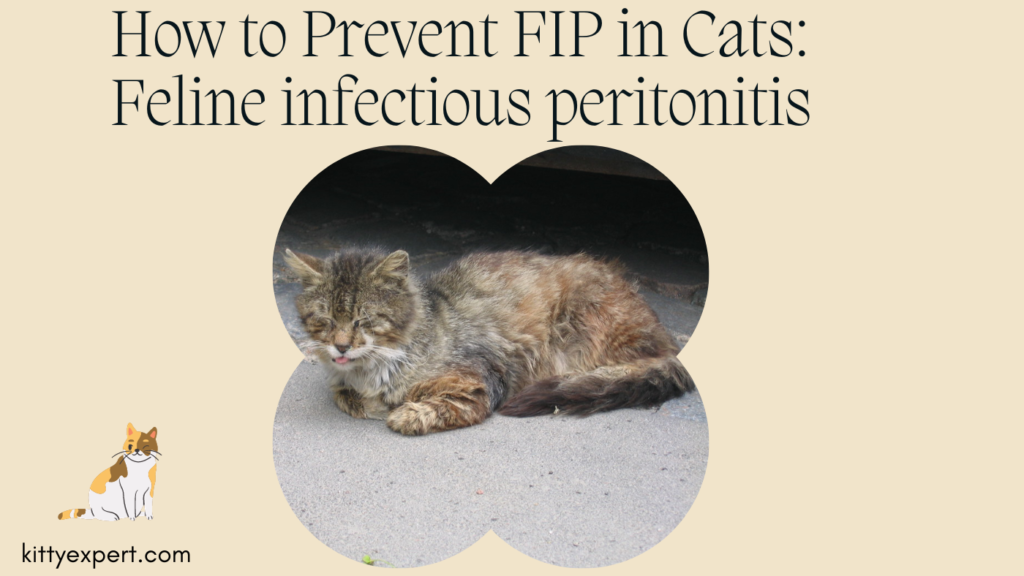Cats, like any beloved pet, are susceptible to various health issues. One particularly concerning disease is Feline Infectious Peritonitis (FIP), a complex and sometimes fatal condition caused by a feline coronavirus. In this blog post, we will explore what FIP is, the root causes behind it, and most importantly, provide a detailed guide on how to prevent FIP in cats. By implementing these preventive measures, you can significantly contribute to your feline companion’s health and happiness.
Understanding Feline Infectious Peritonitis (FIP) in cats
FIP is a viral disease that affects cats and is triggered by certain strains of the feline coronavirus. Importantly, not all cats exposed to the feline coronavirus develop FIP. In fact, many cats can carry the virus without displaying any clinical signs. FIP occurs when the virus undergoes mutation within the cat’s body, prompting an inflammatory response that can impact various organs.
Two primary forms of FIP exist: the effusive or “wet” form and the non-effusive or “dry” form. The wet form involves the accumulation of fluid in the abdominal or chest cavity, while the dry form sees inflammation of organs such as the kidneys, liver, or central nervous system.
How to Prevent FIP in Cats
The best way to prevent FIP in cats is to have regular vet check ups, maintain a clean environment, limit exposure to to other cats, and balanced nutrition.
- Regular Veterinary Check-ups: Consistent veterinary check-ups are paramount for monitoring your cat’s overall health. These routine examinations enable veterinarians to detect early signs of illness, including potential symptoms of FIP. Early detection significantly improves the prognosis and effectiveness of treatment.
- Maintain a Clean Environment: Feline coronavirus, a precursor to FIP, is often transmitted through poop and oral secretions. Maintaining a clean and hygienic environment is vital to reduce the risk of transmission. Regularly clean litter boxes, food and water bowls, and the areas where your cat spends most of its time. It is also important that you give your cat flea treatment.
- Limit Exposure to Other Cats: FIP is more prevalent in multi-cat households and environments with a high cat density. If possible, limit your cat’s exposure to other felines, especially in areas where there might be a higher risk of virus transmission. This precaution is particularly important for kittens, whose immune systems may be more vulnerable.
- Vaccination: While there is currently no specific vaccine for FIP, vaccines for feline coronavirus are available. Engage in a discussion with your veterinarian to determine whether these vaccines are appropriate for your cat, taking into consideration factors such as the cat’s age, health status, and lifestyle.
- Stress Management: Stress can compromise a cat’s immune system, rendering it more susceptible to infections. Create a stress-free environment by ensuring your cat has a quiet and safe space, especially if you have multiple cats. Introduce changes gradually, and be mindful of potential stressors, such as alterations in routine or the introduction of new pets.
- Balanced Nutrition: A well-balanced and nutritious diet is crucial for maintaining a cat’s overall health and immune function. Ensure your cat receives high-quality cat food that meets its specific nutritional needs. Consult with your veterinarian to determine the most suitable diet for your cat’s age, breed, and health condition.
- Hygiene Practices: Practice good hygiene to prevent the spread of infectious agents. Wash your hands thoroughly after handling multiple cats or their belongings. This simple measure can reduce the risk of transmitting viruses, including feline coronavirus, between cats.
- Isolate New Cats: When introducing a new cat into your home, consider isolating it from other cats initially. This approach allows for a gradual introduction, minimizing the risk of disease transmission. Monitor the new cat’s health closely and consult with your veterinarian about appropriate testing and vaccinations.
- Prompt Veterinary Attention: If your cat exhibits any signs of illness, including lethargy, loss of appetite, weight loss, or changes in behavior, seek prompt veterinary attention. Early diagnosis and intervention can significantly impact the course of the disease.
- Educate Yourself: Stay informed about feline health, particularly FIP. Understanding the disease, its symptoms, and preventive measures empowers you to make informed decisions regarding your cat’s well-being. Regularly consult with your veterinarian and stay updated on the latest advancements in feline health care.
- Provide Mental and Physical Stimulation: Enriching your cat’s environment with toys, scratching posts, and interactive play sessions is essential for mental and physical well-being. A stimulated cat is less likely to experience stress, which, as mentioned earlier, can compromise the immune system.
- Consider Environmental Enrichment: Create an engaging environment for your cat by incorporating elements like window perches, cat trees, and hiding spots. Cats thrive on exploration, and a stimulating environment can contribute to their overall happiness and resilience against health challenges.
Conclusion
Preventing Feline Infectious Peritonitis (FIP) in cats requires a proactive and comprehensive approach. From regular veterinary check-ups to maintaining a clean environment, managing stress, and practicing good hygiene, there are various steps you can take to reduce the risk of FIP. While there is no foolproof guarantee against the disease, these preventive measures can contribute to the overall well-being of your feline companions.
A healthy lifestyle, balanced nutrition, and attentive care are essential components of feline health. By being vigilant and taking preventive actions, you can create a nurturing environment that minimizes the risk of FIP and enhances the quality of life for your beloved cats. If you have any concerns about your cat’s health, always consult with your veterinarian for personalized guidance and care. Your commitment to your cat’s well-being ensures they lead a happy and healthy life, free from the potential threats of FIP.

